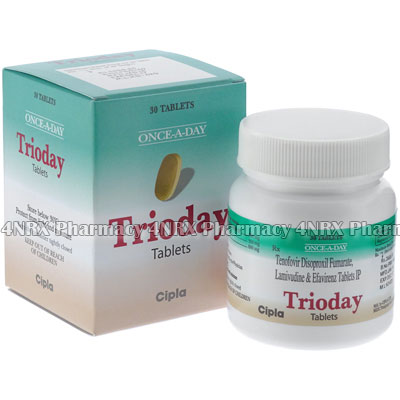 |
Home  HIV Treatments HIV Treatments  Trioday (Tenofovir Disoproxil Fumarate/Lamivudine/Efavirenz) Trioday (Tenofovir Disoproxil Fumarate/Lamivudine/Efavirenz) |
|
|||||||||
|
|
Trioday (Tenofovir Disoproxil Fumarate/Lamivudine/Efavirenz)
What is Trioday (Tenofovir Disoproxil Fumarate/Lamivudine/Efavirenz) used for? Trioday combines three anti-retroviral medications which are used to manage HIV infection in adult patients: Tenofovir Disoproxil Fumarate 300mg, Lamivudine 300mg, and Efavirenz 600mg. The highly effective anti-retroviral therapy is aimed at achieving the following major goals: Virusological - to stop the reproduction of the virus in the body. The goal is considered accomplished when the HIV RNA level declines to under 20-50 copies per ml within 16-24 weeks of the therapy and retained at those levels for indefinite period of time. Immunological - to restore the immune system. When the HIV RNA level goes down, the body gradually restores the quantity of CD4 T-lymphocytes and, subsequently, the adequate immune response. Clinical - to increase the duration and quality of life in HIV-positive patients. In most cases, the therapy prevents the development of AIDS, meaning the diseases that could deteriorate the quality of life and even lead to death. As long as the quantity of HIV RNA copies decreases, unprotected intercourse bears lower transmission risks and allows for conceiving a healthy child. How should I use Trioday (Tenofovir Disoproxil Fumarate/Lamivudine/Efavirenz)? In adult patients, the recommended dose is one tablet, taken once a day, at the same time each day. For better tolerance of the nervous system side effects, it is recommended to take Trioday before bed. It is also recommended to take Trioday on an empty stomach. The increase in Efavirenz concentrations occurring if the medication is taken after the meal may lead to the higher incidence of adverse effects. What are the side effects of Trioday (Tenofovir Disoproxil Fumarate/Lamivudine/Efavirenz)? Trioday may cause the following side effects:
Please Note When prescribing any other medications together with Trioday, your physician has to check for possible interactions with Trioday. The patients have to be warned that the anti-retroviral therapy that they're receiving doesn't eliminate the HIV transmission risks via sexual contacts or blood completely. Therefore, the patients have to take appropriate safety measures. Immune therapy with frequent breaks and subsequent restart of the therapy is highly inadvisable due to the increased probability of virus mutations, resistant to therapy. 
|
||||||||||||||||||||||